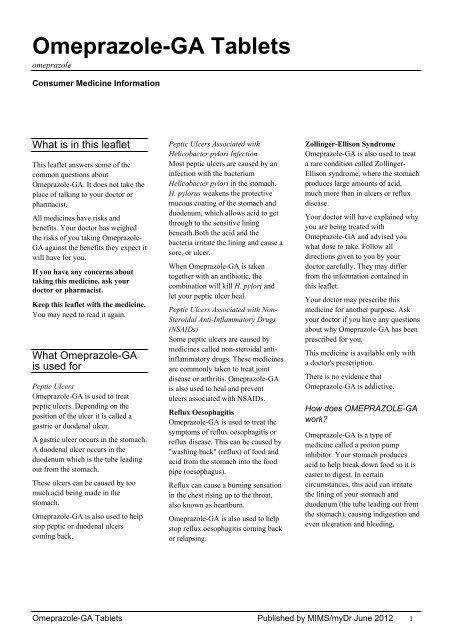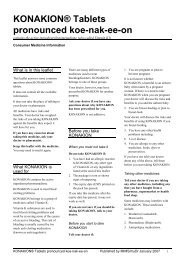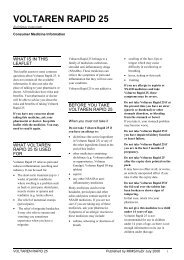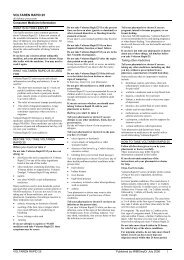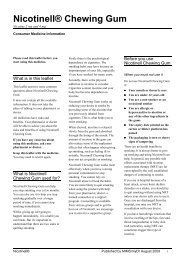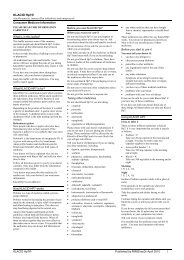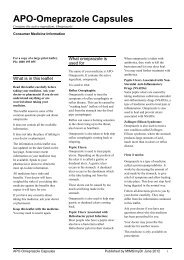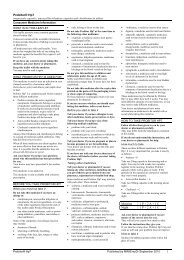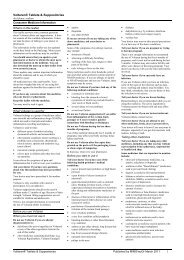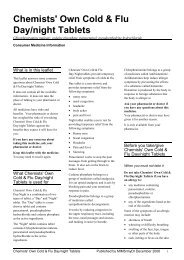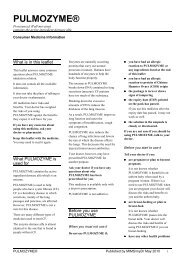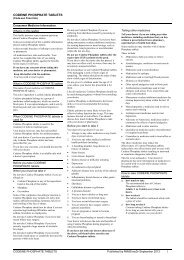Omeprazole-GA Tablets - MyDr
Omeprazole-GA Tablets - MyDr
Omeprazole-GA Tablets - MyDr
Create successful ePaper yourself
Turn your PDF publications into a flip-book with our unique Google optimized e-Paper software.
<strong>Omeprazole</strong>-<strong>GA</strong> <strong>Tablets</strong><br />
omeprazole<br />
Consumer Medicine Information<br />
What is in this leaflet<br />
This leaflet answers some of the<br />
common questions about<br />
<strong>Omeprazole</strong>-<strong>GA</strong>. It does not take the<br />
place of talking to your doctor or<br />
pharmacist.<br />
All medicines have risks and<br />
benefits. Your doctor has weighed<br />
the risks of you taking <strong>Omeprazole</strong>-<br />
<strong>GA</strong> against the benefits they expect it<br />
will have for you.<br />
If you have any concerns about<br />
taking this medicine, ask your<br />
doctor or pharmacist.<br />
Keep this leaflet with the medicine.<br />
You may need to read it again.<br />
What <strong>Omeprazole</strong>-<strong>GA</strong><br />
is used for<br />
Peptic Ulcers<br />
<strong>Omeprazole</strong>-<strong>GA</strong> is used to treat<br />
peptic ulcers. Depending on the<br />
position of the ulcer it is called a<br />
gastric or duodenal ulcer.<br />
A gastric ulcer occurs in the stomach.<br />
A duodenal ulcer occurs in the<br />
duodenum which is the tube leading<br />
out from the stomach.<br />
These ulcers can be caused by too<br />
much acid being made in the<br />
stomach.<br />
<strong>Omeprazole</strong>-<strong>GA</strong> is also used to help<br />
stop peptic or duodenal ulcers<br />
coming back.<br />
Peptic Ulcers Associated with<br />
Helicobacter pylori Infection<br />
Most peptic ulcers are caused by an<br />
infection with the bacterium<br />
Helicobacter pylori in the stomach.<br />
H. pylorus weakens the protective<br />
mucous coating of the stomach and<br />
duodenum, which allows acid to get<br />
through to the sensitive lining<br />
beneath.Both the acid and the<br />
bacteria irritate the lining and cause a<br />
sore, or ulcer.<br />
When <strong>Omeprazole</strong>-<strong>GA</strong> is taken<br />
together with an antibiotic, the<br />
combination will kill H. pylori and<br />
let your peptic ulcer heal.<br />
Peptic Ulcers Associated with Non-<br />
Steroidal Anti-Inflammatory Drugs<br />
(NSAIDs)<br />
Some peptic ulcers are caused by<br />
medicines called non-steroidal antiinflammatory<br />
drugs. These medicines<br />
are commonly taken to treat joint<br />
disease or arthritis. <strong>Omeprazole</strong>-<strong>GA</strong><br />
is also used to heal and prevent<br />
ulcers associated with NSAIDs.<br />
Reflux Oesophagitis<br />
<strong>Omeprazole</strong>-<strong>GA</strong> is used to treat the<br />
symptoms of reflux oesophagitis or<br />
reflux disease. This can be caused by<br />
"washing back" (reflux) of food and<br />
acid from the stomach into the food<br />
pipe (oesophagus).<br />
Reflux can cause a burning sensation<br />
in the chest rising up to the throat,<br />
also known as heartburn.<br />
<strong>Omeprazole</strong>-<strong>GA</strong> is also used to help<br />
stop reflux oesophagitis coming back<br />
or relapsing.<br />
Zollinger-Ellison Syndrome<br />
<strong>Omeprazole</strong>-<strong>GA</strong> is also used to treat<br />
a rare condition called Zollinger-<br />
Ellison syndrome, where the stomach<br />
produces large amounts of acid,<br />
much more than in ulcers or reflux<br />
disease.<br />
Your doctor will have explained why<br />
you are being treated with<br />
<strong>Omeprazole</strong>-<strong>GA</strong> and advised you<br />
what dose to take. Follow all<br />
directions given to you by your<br />
doctor carefully. They may differ<br />
from the information contained in<br />
this leaflet.<br />
Your doctor may prescribe this<br />
medicine for another purpose. Ask<br />
your doctor if you have any questions<br />
about why <strong>Omeprazole</strong>-<strong>GA</strong> has been<br />
prescribed for you.<br />
This medicine is available only with<br />
a doctor's prescription.<br />
There is no evidence that<br />
<strong>Omeprazole</strong>-<strong>GA</strong> is addictive.<br />
How does OMEPRAZOLE-<strong>GA</strong><br />
work?<br />
<strong>Omeprazole</strong>-<strong>GA</strong> is a type of<br />
medicine called a proton pump<br />
inhibitor. Your stomach produces<br />
acid to help break down food so it is<br />
easier to digest. In certain<br />
circumstances, this acid can irritate<br />
the lining of your stomach and<br />
duodenum (the tube leading out from<br />
the stomach), causing indigestion and<br />
even ulceration and bleeding.<br />
<strong>Omeprazole</strong>-<strong>GA</strong> <strong>Tablets</strong> Published by MIMS/myDr June 2012 1
The proton pump inhibitors work by<br />
decreasing the production of stomach<br />
acid, to give relief of symptoms and<br />
allow healing to take place. They do<br />
this by inhibiting a system in the<br />
stomach known as the proton pump.<br />
This does not stop food being<br />
digested in the normal way.<br />
Before you take<br />
<strong>Omeprazole</strong>-<strong>GA</strong><br />
When you must not take it<br />
1. Do not take <strong>Omeprazole</strong>-<strong>GA</strong> if<br />
you have an allergy to<br />
medicines that contain<br />
omeprazole or any of the<br />
ingredients listed at the end of<br />
this leaflet. Some of the<br />
symptoms of an allergic<br />
reaction to omeprazole may<br />
include skin rash, difficulty<br />
breathing, and hayfever,<br />
swelling of the face and<br />
fainting.<br />
2. Do not take <strong>Omeprazole</strong>-<strong>GA</strong> if<br />
you are pregnant or suspect<br />
that you are pregnant.<br />
3. Do not take <strong>Omeprazole</strong>-<strong>GA</strong> if<br />
you are breast-feeding. Your<br />
baby may absorb omeprazole<br />
from breast milk and there is a<br />
chance of harm to the baby.<br />
4. Do not take <strong>Omeprazole</strong>-<strong>GA</strong> if<br />
the packaging is torn or shows<br />
signs of tampering.<br />
5. Do not take <strong>Omeprazole</strong>-<strong>GA</strong> if<br />
the expiry date (EXP) printed<br />
on the bottle has passed. If you<br />
take this medicine after the expiry<br />
date has passed, it may not work<br />
as well.<br />
If you are not sure whether you<br />
should start taking <strong>Omeprazole</strong>-<br />
<strong>GA</strong>, contact your doctor.<br />
Before you start to take it<br />
You must tell your doctor or<br />
pharmacist:<br />
• If you are allergic to any other<br />
medicines, foods, dyes, or<br />
preservatives<br />
• If you have any other medical<br />
conditions<br />
• If you are pregnant or intend to<br />
become pregnant. Your doctor<br />
or pharmacist will discuss the<br />
possible risks of using<br />
<strong>Omeprazole</strong>-<strong>GA</strong> during<br />
pregnancy.<br />
• If you are breast-feeding or<br />
wish to breast-feed. Your doctor<br />
or pharmacist will discuss the<br />
possible risks of using<br />
<strong>Omeprazole</strong>-<strong>GA</strong> during breastfeeding.<br />
• If you are taking any other<br />
medicines, including medicines<br />
you buy without a prescription<br />
from a pharmacy, supermarket<br />
or health food shop.<br />
Some medicines may interfere with<br />
<strong>Omeprazole</strong>-<strong>GA</strong>. These include:<br />
• phenytoin<br />
• warfarin<br />
• diazepam<br />
• ketoconazole, itraconazole,<br />
voriconazole<br />
• clarithromycin<br />
• antiretroviral drugs (atazanavir,<br />
nelfinavir)<br />
• tacrolimus<br />
• clopidogrel<br />
These medicines may be affected by<br />
<strong>Omeprazole</strong>-<strong>GA</strong> or may affect how<br />
well it works. Your doctor or<br />
pharmacist can tell you what to do if<br />
you are taking any of these<br />
medicines.<br />
If you have not told your doctor<br />
about any of the above, tell them<br />
before you start taking<br />
<strong>Omeprazole</strong>-<strong>GA</strong>.<br />
How to take<br />
<strong>Omeprazole</strong>-<strong>GA</strong><br />
Follow all directions given to you<br />
by your doctor or pharmacist<br />
carefully.<br />
They may differ from the<br />
information contained in this leaflet.<br />
If you do not understand the<br />
instructions on the pack, ask your<br />
doctor or pharmacist for help.<br />
How much to take<br />
Your doctor will tell you how much<br />
to take and when to take it. Take<br />
<strong>Omeprazole</strong>-<strong>GA</strong> tablets exactly as<br />
your doctor has prescribed.<br />
If you do not understand the<br />
instructions on the packet, ask<br />
your doctor or pharmacist for<br />
help.<br />
How to take it<br />
Swallow the prescribed dose whole<br />
with a glass of water. If the tablets<br />
are chewed or crushed, they will<br />
not work properly.<br />
When to take it<br />
Take <strong>Omeprazole</strong>-<strong>GA</strong> at about the<br />
same time each day. A consistent<br />
routine can help you to remember to<br />
take it.<br />
In most patients, <strong>Omeprazole</strong>-<strong>GA</strong><br />
relieves symptoms rapidly and<br />
healing is usually complete within 4<br />
weeks.<br />
Tell your doctor if your symptoms<br />
return. It is possible that the<br />
antibiotics may not kill H. pylori.<br />
You may need treatment with further<br />
antibiotics.<br />
If you forget to take it<br />
If you forget to take a dose, take it as<br />
soon as you remember, and then go<br />
back to taking it as you would<br />
normally.<br />
If it is almost time for your next<br />
dose, skip the dose you missed and<br />
take your next dose when you are<br />
meant to.<br />
<strong>Omeprazole</strong>-<strong>GA</strong> <strong>Tablets</strong> Published by MIMS/myDr June 2012 2
Do not take a double dose to make up<br />
for the dose that you missed.<br />
If you have trouble remembering<br />
when to take your medicine, ask your<br />
pharmacist for some hints.<br />
If you take too much<br />
(overdose)<br />
Telephone your doctor or the Poisons<br />
Information Centre (13 11 26) for<br />
advice, or go to Accident and<br />
Emergency Department at your<br />
nearest hospital, if you think that you<br />
or anyone else may have taken too<br />
much <strong>Omeprazole</strong>-<strong>GA</strong>.<br />
Do this even if there are no signs of<br />
discomfort or poisoning. You may<br />
need urgent medical attention. Keep<br />
telephone numbers for these places<br />
handy.<br />
While you are using<br />
<strong>Omeprazole</strong>-<strong>GA</strong><br />
Things you must do<br />
Tell your doctors, dentists and<br />
pharmacists who are treating you that<br />
you are taking <strong>Omeprazole</strong>-<strong>GA</strong>.<br />
If you are about to be started on any<br />
new medicine, tell your doctor or<br />
pharmacist that you are taking<br />
<strong>Omeprazole</strong>-<strong>GA</strong>.<br />
Tell your doctor if you become<br />
pregnant while you are taking<br />
<strong>Omeprazole</strong>-<strong>GA</strong>.<br />
Tell your doctor if, for any reason,<br />
you have not taken your medicine<br />
exactly as prescribed.<br />
Otherwise, your doctor may think<br />
that it was not effective and change<br />
your treatment unnecessarily.<br />
Things you must not do<br />
Do not stop taking <strong>Omeprazole</strong>-<br />
<strong>GA</strong> or change the dose without<br />
first checking with your doctor. Do<br />
not let yourself run out of medicine<br />
over the weekend or on holidays.<br />
Do not give this medicine to anyone<br />
else even if they have the same<br />
condition as you.<br />
Do not use <strong>Omeprazole</strong>-<strong>GA</strong> to<br />
treat any other complaints unless<br />
your doctor says to.<br />
Things to be careful of<br />
Be careful driving or operating<br />
machinery until you know how<br />
<strong>Omeprazole</strong>-<strong>GA</strong> affects you.<br />
<strong>Omeprazole</strong>-<strong>GA</strong> generally does not<br />
cause any problems with your<br />
ability to drive a car or operate<br />
machinery. However, as with many<br />
other medicines, <strong>Omeprazole</strong>-<strong>GA</strong><br />
may cause dizziness in some<br />
people.<br />
Side effects<br />
Tell your doctor or pharmacist as<br />
soon as possible if you do not feel<br />
well while you are taking<br />
<strong>Omeprazole</strong>-<strong>GA</strong>.<br />
<strong>Omeprazole</strong>-<strong>GA</strong> helps most people<br />
with stomach or duodenal ulcers or<br />
reflux disease, but it may have<br />
unwanted side effects in a few<br />
people.<br />
All medicines can have side effects.<br />
Sometimes they are serious, most of<br />
the time they are not. You may need<br />
medical treatment if you experience<br />
some of the side effects.<br />
Do not be alarmed by this list of<br />
possible side effects. You may not<br />
experience any of them.<br />
Ask your doctor or pharmacist to<br />
answer any questions you may<br />
have.<br />
Tell your doctor if you experience<br />
any of the following common side<br />
effects and they worry you:<br />
• constipation<br />
• nausea<br />
• abdominal pain<br />
• diarrhoea<br />
• headache<br />
• skin rash<br />
These are all mild side effects of<br />
<strong>Omeprazole</strong>-<strong>GA</strong>.<br />
Tell your doctor immediately if<br />
you notice any of the following:<br />
• muscle pain or weakness<br />
• dizziness<br />
• "pins and needles"<br />
• changes in sleep patterns<br />
• mood changes<br />
• increase in breast size (males)<br />
• fever<br />
• increased bruising<br />
These side effects are usually rare<br />
but may be serious and need<br />
urgent medical attention.<br />
For this reason, contact your doctor<br />
immediately if you notice any of the<br />
following:<br />
• pain or indigestion during<br />
treatment with <strong>Omeprazole</strong>-<strong>GA</strong><br />
• you begin to vomit blood or food<br />
• you pass black (blood-stained)<br />
motions.<br />
Some people may experience other<br />
side effects while taking<br />
<strong>Omeprazole</strong>-<strong>GA</strong>.<br />
Other problems are more likely to<br />
arise from the ulcer itself rather than<br />
the treatment.<br />
This is not a complete list of all<br />
possible side effects. Other side<br />
effects not listed above may occur in<br />
some patients.<br />
Tell your doctor if you notice<br />
anything else that is making you<br />
feel unwell while you are taking or<br />
soon after you have finished taking<br />
<strong>Omeprazole</strong>-<strong>GA</strong>, even if it is not<br />
mentioned in this list.<br />
After using<br />
<strong>Omeprazole</strong>-<strong>GA</strong><br />
Storage<br />
Keep your tablets in the bottle or<br />
blister pack until it is time to take<br />
them.<br />
If you take the tablets out of the<br />
container they may not keep as well.<br />
<strong>Omeprazole</strong>-<strong>GA</strong> <strong>Tablets</strong> Published by MIMS/myDr June 2012 3
Keep it in a cool, dry place where<br />
the temperature stays below 25°C.<br />
Do not store the tablets or any<br />
other medicine in the bathroom or<br />
near a sink. Do not leave them in<br />
the car or on windowsills.<br />
Heat and dampness can destroy some<br />
medicines.<br />
Keep it where young children<br />
cannot reach it.<br />
A locked cupboard at least one-anda-half<br />
metres above the ground is a<br />
good place to store medicines.<br />
Disposal<br />
If your doctor tells you to stop<br />
taking <strong>Omeprazole</strong>-<strong>GA</strong>, or the<br />
tablets have passed their expiry<br />
date, ask your pharmacist what to<br />
do with any tablets you have left<br />
over.<br />
Product description<br />
What it looks like<br />
<strong>Omeprazole</strong>-<strong>GA</strong> 20 mg tablets are<br />
red brown, oblong, enteric coated<br />
tablets.<br />
Ingredients<br />
Active ingredient<br />
Each tablet contains 20 mg of<br />
<strong>Omeprazole</strong>.<br />
Other ingredients (excipients)<br />
• ascorbyl palmitate<br />
• cellulose- microcrystalline<br />
• crospovidone<br />
• magnesium stearate<br />
• povidone<br />
• lactose<br />
• hypromellose phthalate<br />
• glycerol triacetate<br />
• talc<br />
• iron oxide red (CI77491)<br />
• iron oxide black (CI77499)<br />
<strong>Omeprazole</strong>-<strong>GA</strong> tablets are available<br />
in bottle and blister packs of 30<br />
tablets.<br />
Supplier<br />
www.ascentpharma.com.au<br />
Ascent Pharma Pty Ltd<br />
151-153 Clarendon St<br />
South Melbourne Vic. 3205<br />
For further information call 1800 554<br />
414<br />
<strong>Omeprazole</strong>-<strong>GA</strong> 20mg:<br />
AUST R 123191<br />
AUST R 159686<br />
Date of leaflet preparation:<br />
September 2010<br />
<strong>Omeprazole</strong>-<strong>GA</strong> <strong>Tablets</strong> Published by MIMS/myDr June 2012 4


